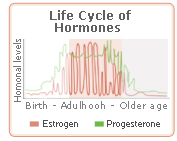Black Cohosh and Menopause
 Black cohosh is increasingly used by women during menopause as an alternative to HRT. Although the science behind black cohosh needs more investigation, many women find this herbal remedy extremely effective in the fight against hot flashes, night sweats, mood swings, and depression. Black cohosh is increasingly used by women during menopause as an alternative to HRT. Although the science behind black cohosh needs more investigation, many women find this herbal remedy extremely effective in the fight against hot flashes, night sweats, mood swings, and depression.
Read on to find out about using black cohosh during perimenopause and menopause.
Black Cohosh Perimenopause
 Perimenopause is the term given to the years leading up to a woman's last menstrual period. During this time, a woman may suffer from menopause-like symptoms. Often caused by reduced levels of eggs in the ovaries, the hormones estrogen and progesterone fluctuate wildly during this time, causing a number of uncomfortable symptoms. Perimenopause is the term given to the years leading up to a woman's last menstrual period. During this time, a woman may suffer from menopause-like symptoms. Often caused by reduced levels of eggs in the ovaries, the hormones estrogen and progesterone fluctuate wildly during this time, causing a number of uncomfortable symptoms.
During perimenopause many women find that they begin to suffer menopausal symptoms such as hot flashes and irregular periods. Between the ages of 40-50, women are continually busy in their daily lives, with both family and work commitments. Many women find menopausal symptoms a disturbing and upsetting addition to their already stressful routines.
For this reason, women often turn to herbal supplements such as black cohosh. Menopause symptoms can be relieved by the plant's estrogen-like properties, which help to rebalance hormones in the female body. Many women find that hot flashes, mood swings, and disturbed sleep become less of a problem as a result of taking black cohosh.
Warning: The limited research undertaken into black cohosh and menopause has only occurred over a short, six-month period. Thus, most doctors would suggest only using this supplement in the short-term.
Keep reading below to learn more about the benefits and dangers of black cohosh during menopause.
Black Cohosh and Menopause
Menopause officially begins as a woman finishes her last menstrual cycle and no longer experiences menstrual bleeding. Although this period in a woman's life is perfectly natural, many women see the end of their fertility as the end of their femininity and identity too. The uncomfortable and sometimes depressing side effects of menopause can leave women feeling powerless, and for this reason some turn to black cohosh for menopause relief.
Below is a list of the menopause symptoms that can be relieved by taking black cohosh supplements.
.  Hot Flushes Hot Flushes
. Night Sweats
. Mild Depression
. Mood Swings
. Sleeplessness
. Headaches
Black cohosh for menopause relief helps to address the hormone imbalance which occurs during menopause, marking the end of the mentrual cycle. Although there has been no scientific research clearly identifying the way in which black cohosh works, it has been suggested that this herb contains a plant hormone similar to estrogen which stimulates estrogen levels and helps to rebalance hormone levels in menopausal women.
While black cohosh produces some positive side effects, it can also be harmful to the body depending on the dosage taken and any existing medical problems a person may have. It's important to consult a doctor prior to using a new supplement in order to prevent any unwanted side effects.
Conclusions
Black cohosh is good for treating some menopause symptoms, but has recently been criticized because it adds artificial hormones to the body. In so doing, black cohosh can trigger side effects including serious conditions such as breast cancer. Other alternative treatments are just as effective as black cohosh, but without the side effects. Non-estrogenic herbs, for example, are a great option for treating menopause symptoms. Read more in the following article.
Which herb should women try? Today women are looking for relief from their menopause symptoms with herbs. Phytoestrogenic herbs and non-estrogenic herbs are good in relieving menopause symptoms, but recent studies show that non-estrogenic herbs have no side effects because they help the body to produce its own hormones instead of introducing hormones like the phytoestrogenic ones. Learn more about non-estrogenic herbs for menopause.
| 

